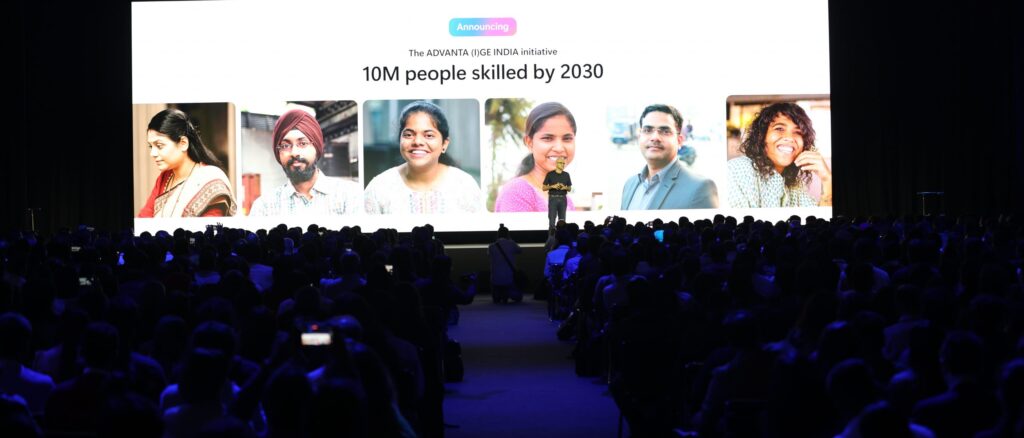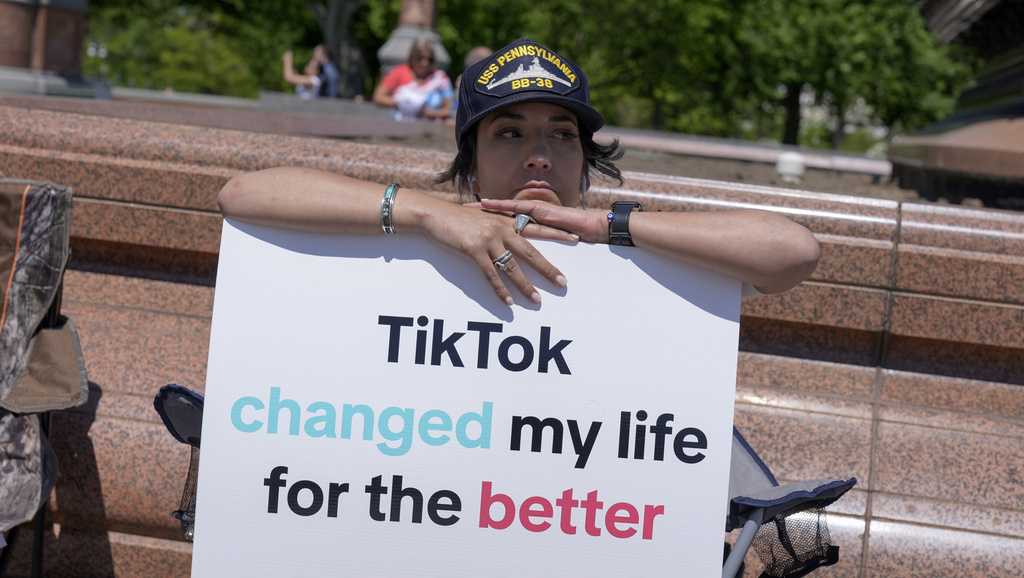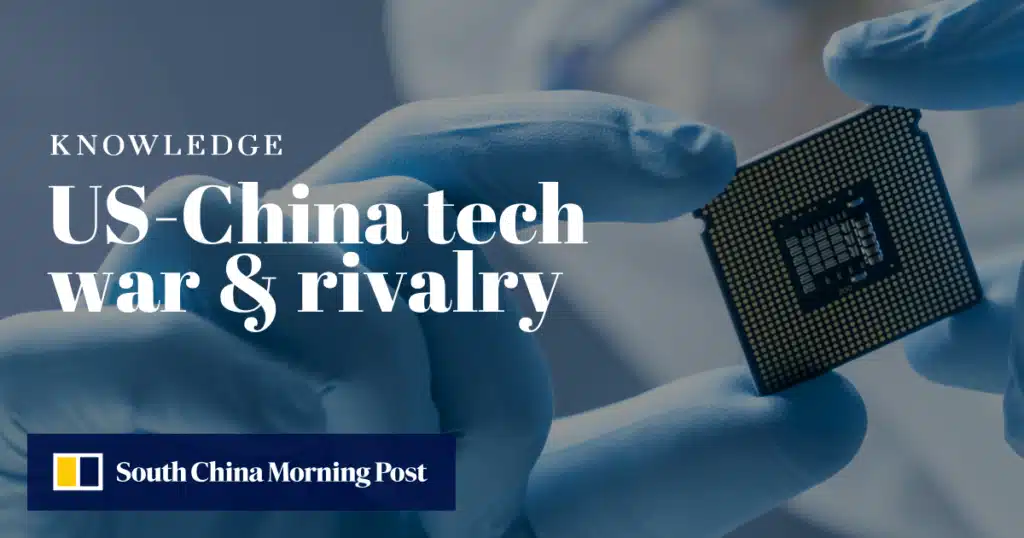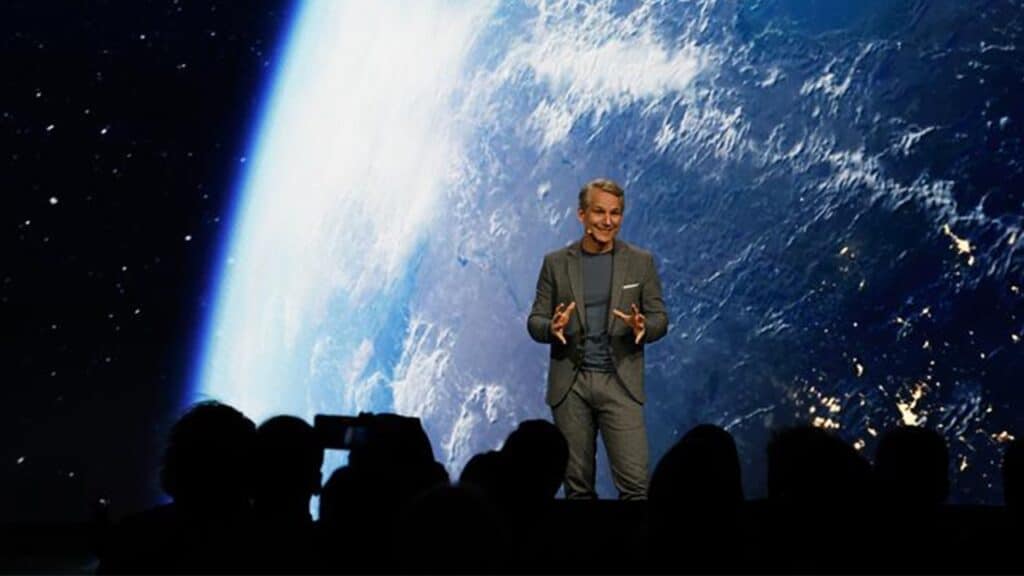Satya Nadella, the chairman and CEO of Microsoft, announced a US $3 billion investment in cloud and AI infrastructure in India over the next two years while on stage at the Microsoft AI Tour in Bengaluru.
Microsoft shared a comprehensive plan to train and skill 10 million people by 2030, reinforcing its commitment to partnering with India on its journey to become an AI-first nation.
Microsoft Research Lab launched an AI Innovation Network, a groundbreaking initiative designed to accelerate the transition from research to real, usable business solutions.
Furthermore, Microsoft and SaaS Boomi have joined hands to propel India’s AI and SaaS ecosystem towards a trillion-dollar economy, aiming to impact over 5,000 startups and 10,000 entrepreneurs.
January 7, 2025, India Satya Nadella, the chairman and CEO of Microsoft, announced today during his visit to India that the company will invest US $3 billion in cloud and AI infrastructure and skill development in India over the next two years, including the construction of new datacenters. In order to realize Hon. Prime Minister Narendra Modi’s goal of making India a developed country (Viksit Bharat) by 2047, this investment intends to speed up AI innovation in India. As part of the second iteration of its ADVANTA(I)GE India program, Microsoft will also help the nation’s long-term competitiveness by providing 10 million people with AI skills training over the next five years.
Microsoft chairman and CEO Satya Nadella stated, “India is quickly emerging as a leader in AI innovation, opening up new opportunities around the nation. Our commitment to making India AI-first is reaffirmed by the infrastructure and skilling investments we are announcing today, which will also help to ensure that individuals and organizations nationwide gain from them.
“Over the past 12 months, Microsoft has been a copilot to making AI a reality in India, taking it from boardrooms to classrooms, commerce to communities, and finance to farmers,” stated Puneet Chandok, president of Microsoft India and South Asia. Today’s announcement strengthens our belief in India’s potential and our resolve to equip the country with the resources and future-ready skills needed to excel in the global marketplace. We will continue to use AI to unlock possibilities for the next few decades and ensure communities across the country have access to the compute they must thrive in the AI era.”
Putting India at the forefront of AI and responsibly developing it
The six guiding principles of Microsoft’s responsible AI strategy are accountability, transparency, privacy and security, fairness, and dependability and safety. Microsoft’s growing role and responsibility as a leader in AI is reflected in this investment. Microsoft is working to make its AI technology more widely available so that businesses and individuals can create and apply it for the benefit of society. According to industry-leading responsible AI principles and Microsoft’s AI Access Principles, the company will run its AI services and infrastructure.
Microsoft plans to extend its AI and cloud infrastructure throughout the nation’s datacenter campuses. Three of Microsoft’s datacenter regions are currently available, and the fourth is scheduled to launch in 2026. The goal of this investment is to create a scalable AI computer environment to satisfy the burgeoning needs of the rapidly developing AI research community and start-ups in India.

Microsoft chairman and CEO, Satya Nadella, on stage at the Microsoft AI Tour in Bengaluru where he announced Microsoft will equip 10 million people in India with cloud and AI skills by 2030.
ADVANTA(I)GE INDIA: Equipping 10 million Indians with essential AI skills by 2030
AI is becoming a crucial skill for professionals as the nature of work changes. With almost 50% more time spent on learning each week than the average professional, Indian professionals are setting the standard for learning and skill development on LinkedIn. They have been early adopters of AI; the number of Indian members who have added AI skills to their profiles has increased by 122% year over year, while the global average is 71%.
With the audacious plan to train two million people in AI skills by 2025, Microsoft started the ADVANTA(I)GE India initiative in 2024. With 2.4 million people trained in less than a year, Microsoft has exceeded this goal ahead of schedule, demonstrating its dedication to enabling fair AI opportunities for every Indian. Interestingly, women made up 65% of the participants, and 74% were from tier II and tier III cities, ensuring inclusive coverage across the entire country.
Today, the company announced its next milestone, to equip 10 million more Indians with essential AI skills by 2030. ADVANTA(I)GE INDIA is part of Microsoft’s Global Skills for Social Impact charter, and these trainings will be delivered in partnership with the government, nonprofit and corporate organizations, and communities.
Shri Jayant Chaudhary, Minister of State (Independent Charge), Ministry of Skill Development and Entrepreneurship said, “India’s vibrant youth and tech talent are key to shaping the future of AI. Through the ‘AI for India’ mission, we aim to empower citizens with cutting-edge AI skills, driving innovation, creating jobs, and bridging the digital divide. Collaborations with global leaders like Microsoft and similar companies are pivotal in this transformation. By equipping our workforce, especially women and youth, with advanced skills, we are building an AI-ready India, poised for digital leadership and sustainable economic growth.”
Fostering the AI Ecosystem in India for developers, startups and digital natives
Microsoft Research (MSR) Lab today announced an AI Innovation Network to deepen its commitment to cultivate the AI ecosystem in India. Under the AI Innovation Network, MSR will build new collaborations, especially with digital natives, to accelerate the transition from research to real, usable business solutions.
MSR India has already initiated a collaboration with Physics Wallah on math reasoning and is in ongoing discussions with other Digital Natives on topics such as causal inference, optimizing Indic LLMs, prompt optimization, and reinforcement learning.
Prateek Maheshwari, co-founder, Physics Wallah said, “At Physics Wallah, we’ve always believed in the power of technology to transform education. Our collaboration with Microsoft Research is a step towards creating tools that understand and support each student’s learning journey. By combining our expertise with Microsoft’s advancements in AI and Large Language Models, we’re working to make education more accessible, personalized, and impactful. We’re working together to help and empower students in meaningful ways.”
MSR India has had a long history of both incubating startups (e.g. Digital Green in AI for agriculture and Everwell in healthcare) and open sourcing research technologies that have then been picked up by startups (e.g. Remidio in medical diagnostics and SoftX Technologies in transportation informatics). The new AI Innovation Network will help accelerate this through mutually beneficial engagement and research collaboration with select Digital Natives. These Digital Natives will gain access to MSR’s cutting-edge research and expertise, while MSR will have the opportunity to deploy its research technologies at scale in partnership with these innovative companies.
Microsoft also announced an AI MoU with SaaSBoomi, the premier community for B2B startups in India. This strategic collaboration aims to accelerate the growth of India’s AI and SaaS ecosystem, making India a product nation and contributing to its trillion-dollar economy. By leveraging SaaSBoomi’s extensive network and Microsoft’s technological expertise, the partnership seeks to foster innovation and entrepreneurship, especially in tier II cities. Over the next five years, Microsoft and SaaSBoomi aim to impact over 5,000 startups and over 10,000 entrepreneurs, upskill more than 150,000 startup employees through focused workshops, foster regional development in 20+ tier II cities, create over 200,000 new job opportunities, and help attract an additional US $1.5 billion in venture capital funding for the Indian AI and SaaS ecosystem. Under the MoU, Microsoft will also support the emergence of more than 50 unicorns and soonicorns; driving advancements in innovation, sustainability, and technological infrastructure.
Supporting communities and advancing AI sustainably
Microsoft is also deeply invested in advancing the sustainability of AI and is addressing the resources needed to support responsible growth of AI infrastructure. Microsoft continues to take bold action on the path to be carbon negative, water positive, zero waste, and protect more land than it uses by 2030, all while empowering others with the technology needed to build a more sustainable future. Learn more in Microsoft’s 2024 Sustainability Report.
Microsoft contributes positively to local communities while advancing global digital transformation. These efforts reinforce its global Datacenter Community Pledge that recognizes its responsibility to be a good neighbor in India and elsewhere where Microsoft operates. For datacenters, this includes addressing the resources needed to power AI – mainly energy and water.
The company also recently announced that its new datacenters will consume zero water for cooling. The new design does not rely on water evaporation, recycling water through a continuous closed-loop system. Microsoft has also secured renewable energy in India through long-term contracts with Amplus and ReNew, contributing to Microsoft’s ambition to be carbon-negative by 2030. As part of the agreement with ReNew, approximately US $15 million of revenue from the contract will be directed towards a community fund to support environmental justice initiatives focusing on women’s livelihoods and economic empowerment, energy access, rural electrification, environmental remediation and water quality improvement, and other concerns of communities disproportionately impacted by pollution and climate change
Share via:





